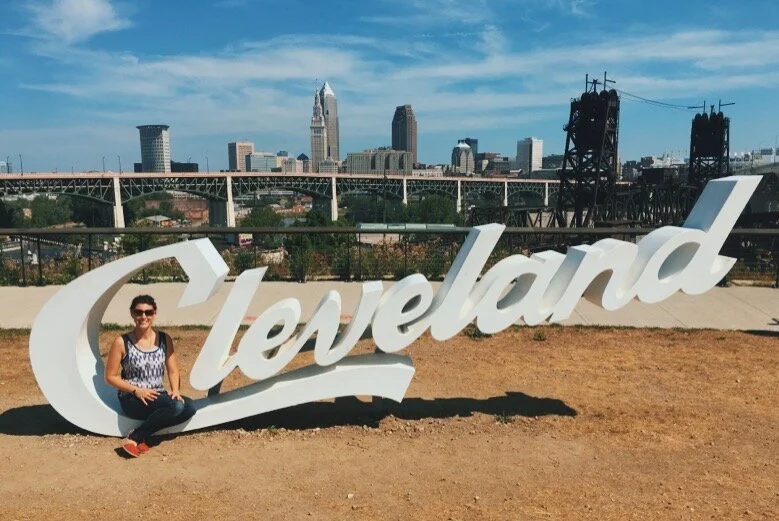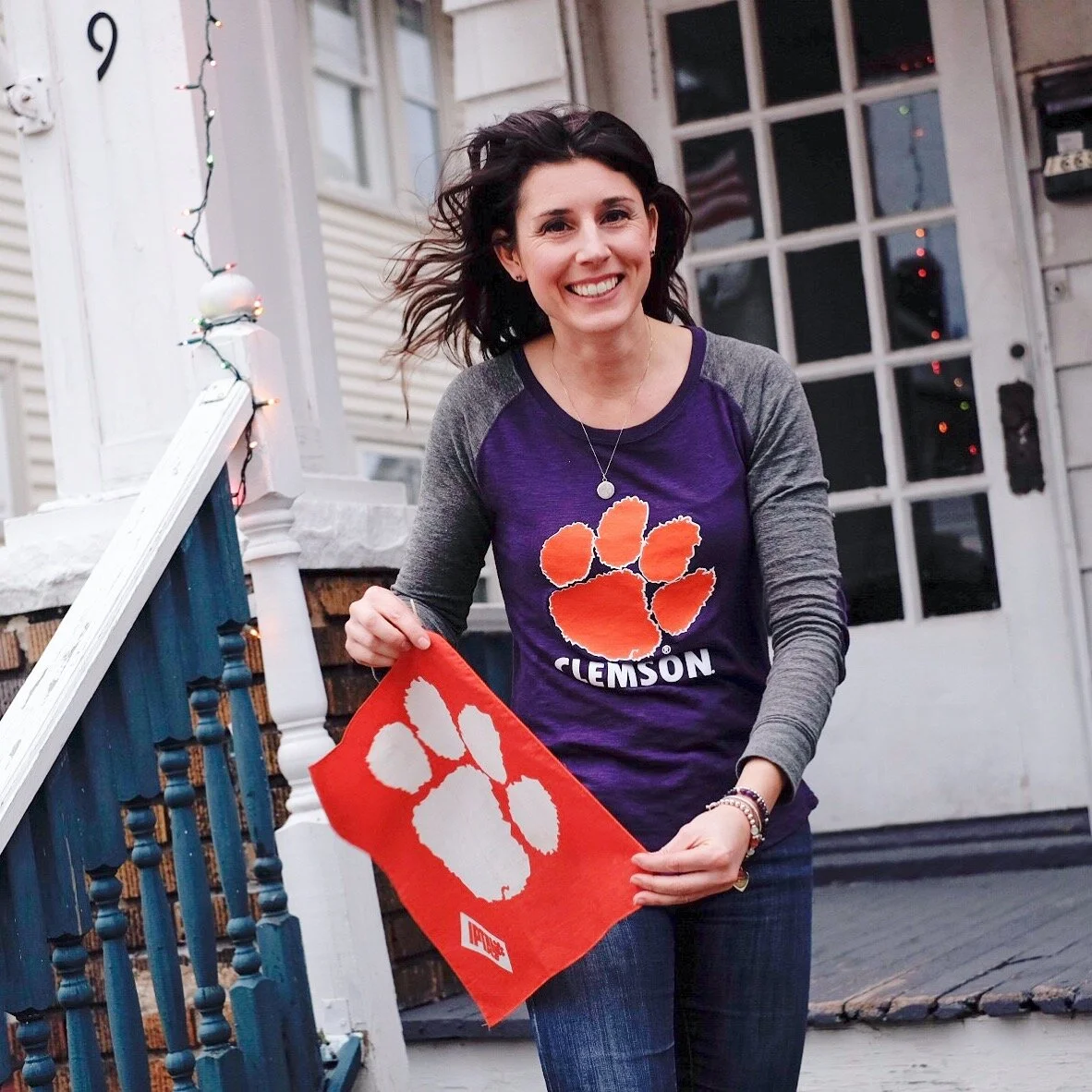When It’s More than a Game
WHEN A GAME BECOMES AN EMOTIONAL BATTLEGROUND
I’ve always joked that if Clemson ever played Ohio State in football, my worst sports fears would become a reality and my loyalties would be put to the test. And for the past three years, they most certainly have.
While I try not to drone on about my upbringing, it’s important to know how emotional connections to a sports team can form and why, when those emotions are running high, it’s so much more than “just a game”.
Trading Snow for Sweet Tea
I was born and mostly raised in a small town in central Ohio, growing up in the home my immigrant grandparents built — the same home where my mom grew up with her siblings. Attracted by its affordability, proximity, and programs, the majority of my family attended Ohio State University. From parents and uncles to several cousins and a brother, it seemed we were destined to be Buckeyes through and through.
Two years before graduating from my high school with a class of students I’d known since kindergarten, my dad’s new job opportunity enticed us to relocate to South Carolina, right around 16th birthday. I blew out my birthday candles surrounded by moving boxes.
We quickly settled into our new home, surrounded by rich red clay and lush wooded lots overrun with kudzu. I was in love with the warmer climate and seemingly endless sunshine. The pace of each day felt like what life should be: patient and unrushed. It was a life that afforded margins of time to breathe in the intoxicating scent of blooming honeysuckle and read a book for the simple joy of it.
But kicking off my junior year at a new school four times the size of my former high school was challenging. Starting friendships from scratch takes time. I plugged into sports and clubs and, luckily, made fast friends.
South Carolina was a transformative, albeit short era, when I felt like an accepted and valued friend. It was something I hadn’t experienced in my previous small-town school, at least not through the hazy lens of my now-fading memories. I was a socially awkward kid dealing with the angst of what most adolescent girls experience: the volatility of friendships and cumbersome social dynamics with other teen girls. We’re a cruel bunch.
In a time when social media (thankfully) didn’t exist, my South Carolina friends and I bonded quickly over late-night phone calls over our crushes or how awful soccer practice was. I fit in well with a low-drama crowd.
I’ll Take “College” for $500, Alex.
In a blink, those two short years were done and so was my time in high school. I had mixed emotions as I walked across the stage to receive my diploma. I had graduated with hundreds of classmates I’d never even met — classmates who’d known each other since elementary school. It was like a celebration with complete strangers, and I once again felt like an outsider.
Clemson University’s Tillman Hall
Ohio was beckoning me. Familiarity was calling me home.
I explored several options for college, having applied to Clemson University (a convenient 20-minute drive from my home) and The Ohio State University (500 miles away).
I was accepted to both. I received scholarships to both.
It seemed like a no-brainer: Committing to a well-known, ranked school with a great football team vs. a rather nondescript state school in South Carolina, not particularly well known outside of the tri-state geography at the time.
Despite the generous scholarship from Ohio State, it would only cover the hefty out-of-state fees, leaving me on my own to cover the normal cost of tuition and room and board I ultimately knew I couldn’t swing.
I graduated at a time when college was somewhat affordable, but my family fell into a weird financial loophole — making too much to qualify me for enough financial aid to cover tuition and board, but not enough to adequately pay for school out of pocket. Like many others my age, I had to go to college. “Figure it out” was the message I received at age 17.
With a heavy heart, I declined the scholarship and my dream to attend Ohio State. I still remember the admission counselor’s response as I fumbled over my rejection speech: “Are you kidding me?!”
No, I am not kidding you.
When Cancer Screws Up Your Plans
My years at Clemson proved to be some of my most memorable. They deepened my relationships with my high school friends, many of whom I can still call today to share life’s ups and downs. They opened their dorm rooms, their mini-fridges, snack stashes, and hours of conversations. Campus life at Clemson felt surreal, nestled in the foothills of the Appalachians by a lake that only magnified the majestic tiger orange and purple sunsets (this is real).
At the time, Clemson’s football team was ok. But the experience of being surrounded by 80,000 fans was exhilarating. When I wasn’t working to pay for school, I remember full Saturdays of tailgating before joining a sea of orange in Death Valley Stadium. For years, I had an idyllic college life.
Like being shaken from a beautiful dream, I was met with the news of something unexpected: My dad lost his job.
It was a blow to our family and to his pride. His next job opportunity forced yet another relocation for the family — all except me — back up to Ohio. With only three short semesters left, I would finish college in South Carolina, ironically, 500 miles away from my family’s new “home”. My Sunday suppers were spent with surrogate families.
And life kept marching. My friends and I graduated and experienced milestones of landing new jobs with health benefits in cities far away from campus.
With no family and my friends leaving for big opportunities, I once again felt lonely. I took a short job stint in Illinois to be closer to family, still wondering where home really was.
Then, another shattering dream: my mom was diagnosed with breast cancer.
And then, There’s Cleveland
To be closer to my mom while she underwent chemo treatments, I took a job in Cleveland. Unfairly influenced and jaded by the media, I wasn’t exactly thrilled to move into my drafty 100-year-old apartment in late November of 2006.
When I say I barely knew one person, I mean that literally. I hung the last curtain just in time for what I now understand to be the social hibernation months, and the longest, possibly loneliest winter I’ve ever endured. (Which is an annual event, I’ll come to learn.)
Cleveland is not a particularly warm or inviting city to outsiders. In fact, it’s the kind of city that seems to thrive on giving anyone without roots in Northeast Ohio a cold shoulder, as if she knows we’ll just leave again. I can’t say I blame her.
Once a beautiful thriving hot spot from the Gilded Age through the Industrial Revolution, Cleveland attracted the biggest celebrities and the best industries. We’re the home of John D. Rockefeller and his legacy empire. Dean Martin’s fame stems from his early performances at The Hollenden Hotel.
But Cleveland was hit hard when the steel industry moved to foreign lands and economic recessions slapped her like the frigid winter waves of Lake Erie. The man she loved and worshipped cruelly left her in the middle of the night for his new football mistress in Baltimore. She never got over it.
Then her children moved to the glitz and allure of cities like Chicago, Austin, Nashville, and Denver. As the riots raged and as she aged, Cleveland began to lose her best assets. Time ravaged her once good looks. And then her river burned, making her a public mockery. Very few survive the insults of being called the “Mistake on the Lake” without deep, wounding scars.
With no roots, no ties to this city, it was an uphill slog to try to build the same deep friendships I’d experienced just years before. Cleveland would eventually steal my heart, but that’s another story for another day.
When The Ribbing Isn’t About Sports
During those years, and from a distance, I saw the transformation of my alma mater. Donors opened their wallets to fund and fulfill Clemson’s vision to be a highly-ranked public school. The football program would strengthen into one that would ultimately win a National Championship.
I watched the Tigers win that wonderful day with one only other fan, and an adopted one at that: my husband. He’s a Miami University alum.
I suffer from major depressive disorder which means, among other symptoms, I frequently look back on what few long-term memories my brain can recall with an immense amount of sadness.
However, my time in South Carolina — and particularly at Clemson — was an era I recall with great fondness and happiness. It was a time when everyone was cancer-free. When life and friendships felt easy. When my chronic illness wasn’t funneling thousands of dollars per month into treatments, protocols, and pills.
It’s amazing how one game can open a flood of emotions and memories. We love to taunt our opponents but rarely do we ponder what the ramifications are. It’s just a game, right?
This year, our North vs. South matchup was more than a game. I had personalized and channeled my pain into four periods of watching post-adolescent men tackle each other and hurl an oddly shaped ball down the field.
I wanted Clemson to win because I needed a personal victory in life. I needed my dad, recently diagnosed with cancer, not to be sick. I needed my own health to recover. I needed my mom’s second heart surgery — following a botched surgery (ironically, performed at Ohio State) to make her better.
So when the ribbing started, I fell apart.
I had to wonder: Did she know that her texts were hurting my soul? Did he know that his scathing Facebook post was like a sword ripping open my pain and loss? That I was reading these words holding a phone with hands marred and scarred from my chronic illness?
You see, sometimes sports jabs aren’t just about the game. They’re an assault on happy memories. I wonder if anyone knew how isolated their online comments made me feel, a reminder of yet again being an unwelcome foreigner in a cold and cruel city surrounded by what felt like a cliquey, sneering social club.
Did you not know I had once wanted to be part of your tribe?
Win, Lose, Or Grace
After my emotions calmed and my logic regained composure, I realized I had over personalized an issue that I’d blown out of epic proportion. They too, had experienced their losses. The Ohio State win over Clemson, after so many seasons of being media-shamed, may have been the one figurative and literal victory for thousands of fans during this crappy pandemic year.
Through my pain, I could see what was really happening. Maybe that victory alleviated her recent pain and loss for just a few minutes. Maybe him bashing my team made him feel like he was in control during a time when his job was unstable.
When have I been guilty of jabbing an opposing sports fan without any care about how it made them feel? #toomanytimestocount
It takes grace to understand what’s really really being said and love people all the more for it.
Our society mistakes self-control and self-restraint as signs of weakness, often by those who seem to lack the common sense to use them. In reality, they’re the foundational building blocks of emotional intelligence, intuition, and maturity. Anyone can leave a text message or post and walk away, callously leaving the recipient to hold the emotional baggage. It’s no wonder we’ve become gradually more indifferent toward each other. We treat our abused rescue dogs like royalty while verbally abusing mankind. (Someone needed to say it.)
But it takes wisdom and compassion to see the deeper root of the pain behind those words and respond with kindness, calmness, or reserve to not respond at all — and still pick up the friendship the next day. In the end, do we love the person more than the game? More than the small issue at hand?
After all, I don’t think they’re just words. They’re a cry for help. We’re searching for answers to deeper questions like, “Am I significant?” and “Do I matter here?” And when a sports team falls short, along with so many other hopes in life, so often does our significance. The answer can feel like a resounding, “no”.
You see, grace is an opportunity to respond with kindness even when it doesn’t feel logical. It’s leaning into forgiveness because we’ve been forgiven for our own words and actions.
It’s hearing the real words behind the words and say, “I still love you, anyway. I celebrate in your victory.”








